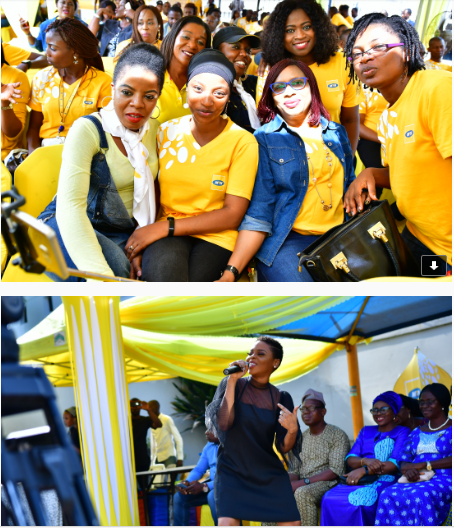A growing wave of digital transformation driven by strategic partnerships is changing how kids study, dream, and invent as Nigeria struggles with human capital development. It started with a modest revolution in Abuja’s public schools, writes Nicholas Uwerunoye.
Last Friday saw a silent but significant event in Abuja, a nation where policy promises and practical realities frequently conflict with regard to education.
Together with the telecom behemoth MTN Nigeria, the Federal Capital Territory Administration (FCTA) formally handed out 600 digital tablets to 12 public secondary schools in the FCT, marking a significant step in rethinking the future of public education.
The FCT Minister of State, Dr. Mariya Mahmoud, who was represented at the ceremony by Michael Bawa, her Special Assistant on Technical Matters, called the initiative “more than just a donation.”
These tablets, in her words, “are an investment in our children, in digital inclusion, and in the development of our country.”
The importance of such a collaboration extends much beyond the momentary excitement of device transfers. Nigeria’s human development issues are rooted in the country’s underdeveloped educational system, restricted access to contemporary instruments, and widening digital gap.
Abuja is the capital of the country, but for far too long, many of its public schools have been operating in an environment that is very different from the technological innovations that characterize education in the twenty-first century.
This contribution by MTN Nigeria is a component of a larger national initiative.
The telecom company has said that, as part of its corporate social responsibility (CSR) to support digital education and create classrooms that are prepared for the future, it is delivering 4,600 tablets to public schools in Nigeria.
Ernest Ndukwe, MTN Nigeria’s chairman of the board, clarified that the action is intended to “support access to digital learning” and provide an ecosystem that ensures no student is left behind in the rapidly evolving digital era.
The advantages for the FCT are both practical and symbolic. Through the use of the gadgets, students will be exposed to digital research, interactive learning, and customized study habits that are prevalent in higher education systems worldwide.
Beyond technology, however, they will bring about a change in perspective—from teaching-centered paradigms to student-driven inquiry, from textbook dependence to multimedia learning, and from rote memorization to critical thinking.
Director of the FCT Education Secretariat’s Department of Science and Technology, Kolawole Olabashola, who spoke on behalf of Mandate Secretary Danlami Hayyo, summed up the excitement perfectly.
This program will put our institutions in a position to compete on a global scale, he stated. “It gives students new opportunities in public education and helps close the digital divide.”
Such “new horizons” are not merely poetic; they are essential. In a country with a population of more than 200 million, the World Bank estimates that over 60% of children are in “learning poverty,” which is defined as not being able to read and comprehend a simple text by the age of ten.
Nigeria continues to have one of the lowest Human Development Indexes (HDI) in the world, a situation exacerbated by low levels of educational attainment, restricted access to healthcare, and slow economic participation.
There is a unique chance to change this dire trend if digital learning is widely implemented. Incorporating digital tools into the public school system, such as internet access, teacher training, and content-rich platforms, may eventually boost test scores by 30% and retention rates by up to 20%, according to experts.
Furthermore, pupils who are digitally literate are better equipped for a global labor market that is favoring tech-savvy workers over those with more conventional competencies.
But there are costs associated with this change. An estimated ₦300 billion may be spent on supplying digital tablets, e-learning materials, and dependable infrastructure to just 50% of Nigeria’s public secondary schools.
Read Also: Capital Displaced: Abuja’s Indigenous Communities Face Economic, Political Extinction
In five years, the amount might be close to ₦500 billion when expanded to include teacher training and digital lab upkeep.
Although this figure may cause some people to wonder, the return on investment is significant.
Countries like Rwanda, Kenya, and Estonia who have implemented national digital education frameworks have seen quantifiable improvements in employment, civic involvement, literacy, and even innovation.
In Nigeria, every kobo invested represents a down payment on the country’s wealth, peace, and productivity rather than merely a cost.
Because of this, the FCTA-MTN relationship is a very important case study. It provides a model for collaborating with the private sector to jointly generate value for the coming generation.
It conveys to other corporate actors that education is a shared goal rather than merely a government duty.
Additionally, the project is a perfect fit with President Bola Ahmed Tinubu’s Renewed Hope Agenda, which emphasizes that digital inclusion, youth empowerment, and education reform are essential components of national growth.
Projects like these have the potential to revitalize towns, improve schools, and transform today’s underprivileged youngsters into tomorrow’s leaders, inventors, and creators if they are carried out regularly.
Beyond just pixels and processors, the 600 tablets that are starting their journey into Abuja classrooms hold potential. An assurance that all children should have the opportunity to learn, compete, and prosper in the digital era, irrespective of their financial circumstances.
A pledge that long-neglected public schools can be transformed into centers of innovation and quality. Above all, a commitment that Nigerian education’s future is not just possible but also achievable.
That future will be worth every cent if it starts with a single student in Abuja using a tablet screen to realize their full potential.



